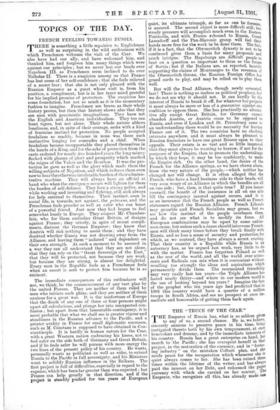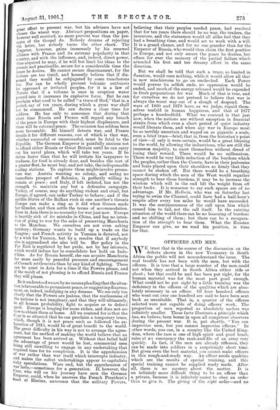THE " TRUCE OF THE CZAR." T HE Emperor of Russia
has, what is so seldom given to any of us, a second chance. He is, we believe. sincerely anxious to preserve peace in his time, being instigated thereto both by his own temperament, at once benevolent and dreamy, and by the immediate interests of his country. Russia has a great enterprise on hand, her march to the Pacific ; she has overspent herself in that project, in the restoration of the currency, and in "foster- ing industry " on the mistaken Colbert plan, and she needs peace for the recuperation which whenever she is quiet always comes to 'her. She has been ruined three times within the lifetime of the writer, and has always paid the interest on her Debt, and redeemed the paper currency with which she carried on her contest. , The Emperor, who recognises all this, has already made one great effort to prevent war, but his advisers have not hosen the wisest way. Abstract propositions on paper, however well received, no more prevent war than the pre- cepts of the Gospel do. Nobody dreams of rejecting the latter, but nobody turns the other cheek. The Emperor, however, gams immensely by his renewed alliance with France and its extreme popularity in that country, and with the influence, and, indeed, direct power, thus acquired he may, if he will but limit his ideas to the prosaic and practicable, secure for a considerable time the peace he desires. He cannot secure disarmament, for the nations are to timid, and honestly believe that if dis- armed they would be subjugated by some treacherous foe. Nor can he wholly prevent volcanic outbursts by oppressed or irritated peoples, for it is a law of Nature that if a volcano is once in eruption water poured into it increases its explosive force. But he can proclaim what used to be called " a truce of God," that is, a Pen years, during which a great war shall period, say of ten not be commenced. He can decree a close time for soldiers. He has only to announce that during that short time Russia and France will regard any breach of the peace in Europe with their highest displeasure, and there will be external peace. The occasion has seldom been more favourable. He himself detests war, and France dreads it for different reasons, one of which is that war, whether successful or unsuccessful, must be fatal to the Republic. The German Emperor is painfully anxious not to offend either Russia or Great Britain until he can carry out his naval plans, which will take ten years. If he drives faster than that he will irritate his taxpayers to madness, for food is already dear, and besides the cost of a greater fleet, he must buy, and not take, the indispensable coaling stations. To capture them might. involve prema- ture war. Austria wanting no colony, and seeing no immediate prospect of Salonica, is perfectly willing to remain at peace ; and Italy, if left isolated, has not the strength to maintain any but a defensive campaign. Turkey, of course, may do anything violent and cruel, but Europe, if agreed, can order Turkey to behave ; and if the spitfire States of the Balkan rush at one another's throats Europe can make a ring as it did when Greece made her blunder, and then settle the terms of accommodation. Even in Asia there is no necessity for war just now. Europe is heartily sick of its mistake in China, and has no inten- tion of going to war for the sake of preserving Manchuria to the Manchus. We ourselves are not even asking territory; Germany wants to build up a trade on the Yangtse ; and French activity in Yunnan is dictated, not by a wish for Yunnan, but by a resolve that if anybody else is aggrandised she also will be. Her policy in the Far East is regulated by her pride, not by her interests, which would induce her to consolidate her hold on Indo- China. As for Russia herself, she can acquire Manchuria far more easily by peaceful pressure and encouragement of Cossack settlements than by any kind of fighting. There can be quiet in Asia for a time if the Powers please, and if the result of not pleasing is to offend Russia and France they will please.
Be it understood we are by no means pleading that the situa- tion is favourable to permanent peace, or suggesting disarma- ment, or, indeed, indulging in any dreams. We see only too clearly that the Powers are jealous, that the restlessness of the nations is not imaginary, and that they will ultimately, nna y, in all human probability, fight to acquire or to defend spoil. Europe is longing for more riches, and does not see how to obtain them at home. All we contend for is that the CAI. is so situated that he can proclaim a temporary truce, which, though it is not peace such as followed the ex- haustion. of 1815, would be of great benefit to the world. The great difficulty in his way is not to arrange the agree- ment, but the method of making the world believe that an agreement has been arrived at. Without that belief half the advantage of peace would be lost, commercial men being still unwilling to engage in any undertaking that required time for its completion. It is the apprehension of war rather than war itself which an. terrupts industry, and makes the safest undertakings appear to capitalists risky speculations. Wars end, but the apprehension of war lasts,—sometimes for a generation. If, however, the Czar, who will on his journey have seen the German Emperor, could, when he answers the French President's toast at Rheims, announce that the military Powers, believing that their peoples needed peace, had resolved that for ten years there should be no war, the traders, the inventors, and the statesmen would all alike feel that they had a breathing time, and would set to work with a will. It is a grand chance, and for no one grander than for the Emperor of Russia, who would thus claim the first position in Europe, and not only secure the peace he desires, but efface for ever the memory of the partial failure which attended his first and too dreamy effort in the same direction.
But we shall be told that such a truce, so limited in duration, would cure nothing, while it would allow all that is now mischievous to go on unchecked. Each Power would pursue its selfish ends, no oppression would be ended, and much of the energy released would be expended in fresh preparations for war. Much of that is true, and for ourselves we do not pretend to believe that war is always the worst way out of a slough of despond. The wars of 1860 and 1870 have, as we judge, repaid them- selves tenfold in human happiness, and that of 1877 perhaps a hundredfold.. What we contend is that just now, when the nations are without exception in financial straits from which even a short period of quiet industry would liberate them, and when any war in Europe must be so terribly uncertain and waged on so gigantic a scale, even a brief truce—brief, that is, from the historian's point of view—if only it were certain, would be a great blessing to the world, by allowing the industrious, who are still the immense majority, to exert themselves without dread of losing their reward. There would be no millennium. There would be very little reduction of the burdens which the peoples, rather than the Courts, have in their jealousies and fears placed upon their shoulders so firmly that they cannot be shaken off. But there would. be a breathing space during which the men of the West would. regather strength to bear those burdens, it may be to increase the wisdom which will in the end. lift the weight from off their backs. It is nonsense to say such spaces are of no advantage. If Mr. Holbein, who was on Saturday last trying to swim the Channel, could have had a half-hour's respite after every ten miles he would have succeeded. It was the continuousness of the call upon him which caused him to fail, not the call itself. In the existing situation of the world there can be no lessening of burdens and no shifting of them ; but there can be a recupera- tion of the strength to bear them. What the Russian Emperor can give, as we read his position, is time for that.



































 Previous page
Previous page